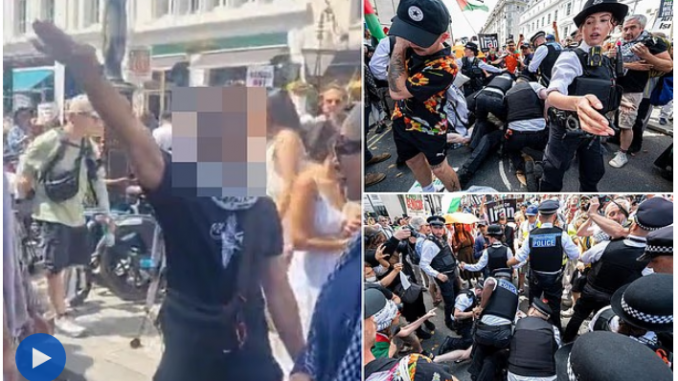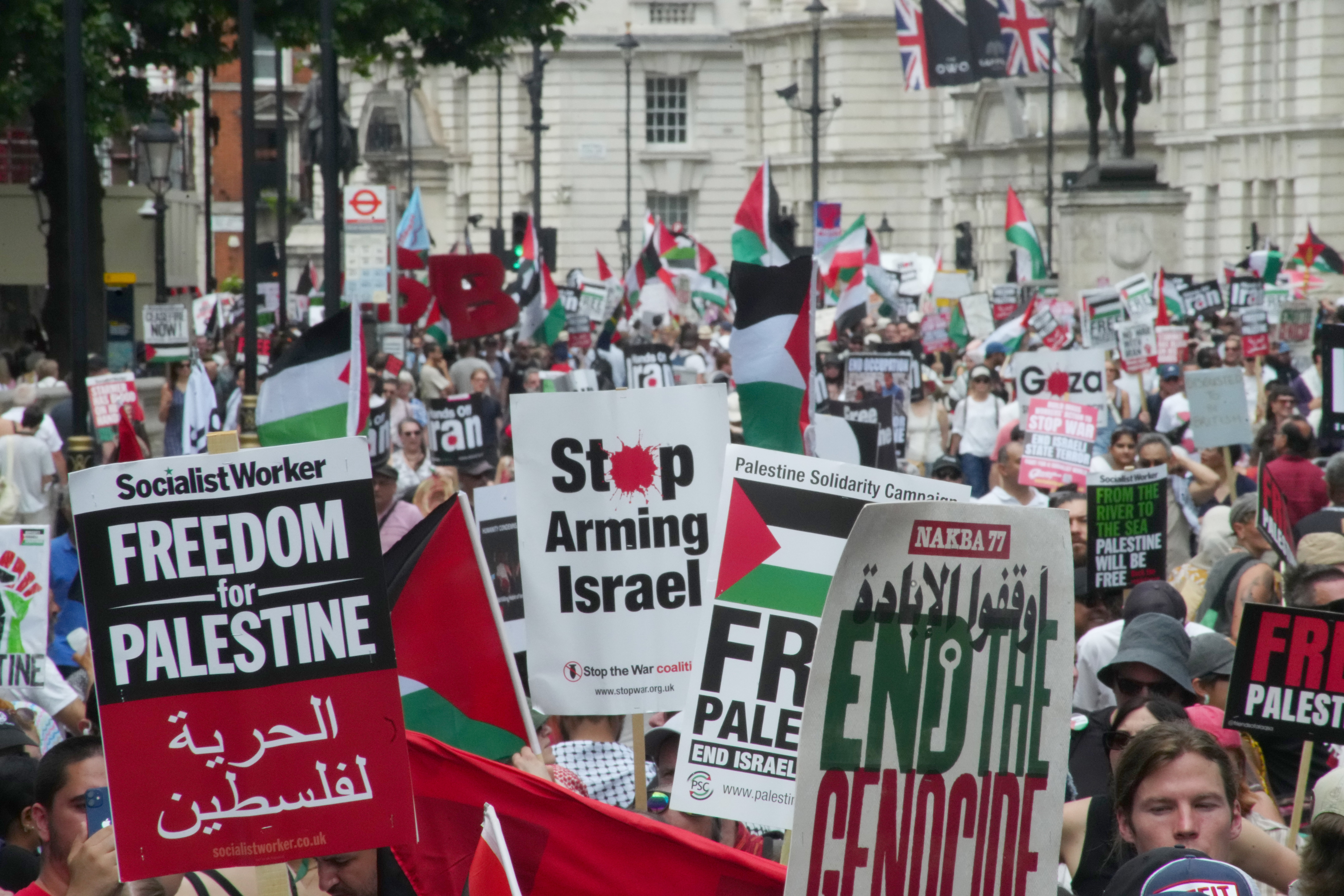
Violence has erupted on the streets of London as police arrested a suspect for throwing a bottle at pro-Israeli counter-protesters as thousands marched through the capital in support of Palestinians. Activists calling for urgent aid to be sent to Gaza and for Israel to stop bombing Iran yelled ‘shame on you’ at the pro-Israeli counter-demo. But things took an ugly turn as they passed a group of counter-protesters assembled near Waterloo Bridge by the pro-Israeli group Stop the Hate. The Met Police said it chased a suspect through the crowd down the Strand after a bottle was thrown at counter-protesters and apprehended them. Elsewhere, a man was filmed appearing to make a Nazi salute.
| Published June 21, 2025
Thousands of pro-Palestinian protesters flooded the streets of central London on June 21, 2025, demanding an end to Israeli military action in Gaza and its recent strikes on Iran. The demonstration, marked by chants like “Shame on you” and “Stop bombing Iran,” unfolded alongside a smaller pro-Israel counter-rally, triggering brief clashes and multiple arrests. As tensions abroad intensify, the protest revealed sharp divisions at home — with public pressure mounting on UK leaders to reassess their stance in the rapidly escalating Middle East conflict.
✊ Key Chant Perspective
Protesters carried Palestinian and Iranian flags, chanting slogans like:
“Free, free Palestine”
“Occupation no more, Israel is a terrorist state”
“Stop bombing Iran”
and taunted passing pro-Israel counter-demonstrators with “Shame on you”.
⚠️ Clashes & Police Response
-
A smaller pro-Israel counter-protest organized by Stop The Hate gathered near Waterloo Bridge.
-
Tensions escalated: a bottle was reportedly thrown at the counter-group. Police chased and arrested a suspect.
-
Authorities made eight arrests overall for public order offences.
🗣️ Prominent Voices on the Ground
-
Former First Minister Humza Yousaf contrasted the current moment with Iraq War-era protest, urging UK leaders not to dive into another distant military conflict.
-
Singer Paloma Faith spoke out against violence and dehumanization, calling for accountability among those “who facilitate these crimes”.

Later footage also emerged seeming to show a protester performing a Nazi salute – police said an arrest has been made

The Met Police said it chased a suspect through the crowd down the Strand after a bottle was thrown at counter-protesters and apprehended them

At least two arrests have taken place at today’s march, the Met Police have said

Protesters waved Palestinian flags and chanted ‘free, free Palestine’, ‘occupation no more, Israel is a terrorist state’ and ‘stop bombing Iran’ on Saturday (Jeff Moore/PA Wire)

Thousands of pro-Palestine protesters marched towards Whitehall from Russell Square in central London on Saturday (EPA)
 Implications
Implications
-
UK Political Pressure Intensifies
The protest adds urgency to public calls for the British government to halt arms sales to Israel and adopt a more neutral stance in the Israel-Iran conflict. -
Deepening Social Polarization
Clashes between pro-Palestinian and pro-Israel demonstrators underscore growing divisions in UK society over foreign policy and Middle East alliances. -
Heightened Security Concerns
The arrests and physical altercations during the march highlight the risk of street-level violence tied to international events, prompting stronger police monitoring. -
Impact on Foreign Policy Debate
Public displays of opposition may influence parliamentary discussions on military cooperation, intelligence sharing, and diplomatic recognition in the region. -
Protest as Global Signal
The visibility of London’s march — including viral chants and symbolic imagery — contributes to a broader wave of international anti-war sentiment aimed at Israel’s regional actions.
 Overall Takeaway:
Overall Takeaway:
The London protest reflects how deeply the escalating Middle East conflict has penetrated global public consciousness, sparking visible unrest even far from the battlefield. As thousands marched to denounce Israeli actions in Gaza and Iran, the demonstration became more than a show of solidarity — it was a direct challenge to UK foreign policy, social unity, and the limits of public tolerance for perceived complicity in war. The event underscores a growing global demand for accountability, diplomacy, and restraint amid rising international tensions.




Be the first to comment